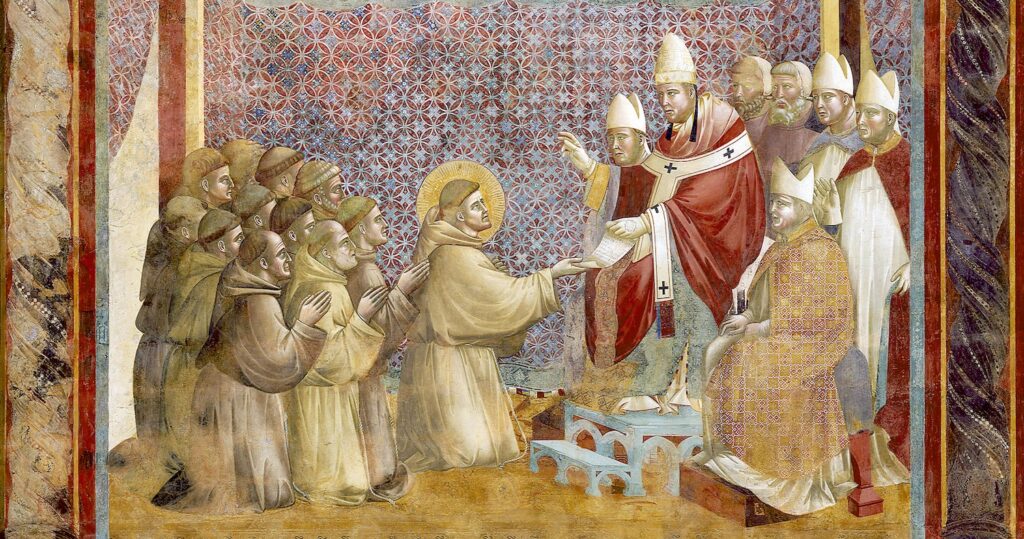This year we are celebrating the anniversaries of two ‘sets of rules’ that are of great importance to us as a Franciscan Family. On 29 November 1223, the Rule of the Franciscan Order was approved by Pope Honorius III. On 10 December 1948, the UN General Assembly proclaimed the Universal Declaration of Human Rights.
Although both dates – 29 November and 10 December – are very close to each other on the calendar, they are also separated by just over seven centuries. And it is not only the number of years that initially distinguishes the texts. While the Franciscan Rule was written only for a very small number of men who belonged to the Catholic Church and made the conscious choice to live in community without marriage and family, the Universal Declaration of Human Rights applies to all people who live and will live on this earth, regardless of their religious, ethnic, or national affiliation.
Another essential and fundamental difference is the character of the texts: one is a rule – that is, it establishes rules and obligations for those who accept it. The other enshrines rights that belong to every individual, by virtue of being a human being.
Yet, of course, rights and duties go hand in hand: my rights always include the duty to bestow the same right on others and to respect it.
Gospel and human dignity
So, beyond the date, what is the unifying factor of these two texts and what is their meaning to us as a Franciscan family?
If we try to boil down the respective texts to just a few key words, we can discover their commonality and the meaning and demands that they place on us as Franciscans. Those key words are ‘Gospel’ and ‘human dignity’. The Rule of the Franciscan Order is about “observing the Gospel”. The Declaration of Human Rights is about “respecting the dignity” of every person. Human dignity and the Gospel are intimately intertwined and thus fundamental to the Franciscan spirituality and way of life.
In his ‘first sermon’ in his home synagogue in Nazareth, Jesus explains what his mission is. He does this by quoting the prophet Isaiah: “The Spirit of the Lord is on me, because he has anointed me to proclaim good news to the poor. He has sent me to proclaim freedom for the prisoners and recovery of sight for the blind, to set the oppressed free …” (Luke 4:18).
With this, Jesus makes it clear to whom this good news is addressed: the ‘poor’. Today, we would perhaps also say, “those who are marginalized and discriminated against by society.” At the United Nations, we often speak about those who are “particularly vulnerable” or “at risk”.
He also makes it clear what this good news consists of: the release of the prisoners, sight for the blind, and freedom for the oppressed.
Furthermore, Jesus makes it clear that this Gospel – this good news – is happening today. “Today” means during the life and work of Jesus. “Today” also means during the time of Francis and Clare – in their work and life, the Gospel happened. And “today” also means today – in our days. Everywhere where we proclaim the Gospel in word and deed.
The good news of today
The list of examples in Jesus’ sermon, and also in the words of the prophet Isiah, are only examples of all the ways it is possible to stand up for justice and against exclusion. Certainly, we can say that they are examples that stand for all human rights.
In the defense of human rights and human dignity through the work of the United Nations and the work of countless human rights organizations, the “today” of the Gospel is also taking place. That is why we see it as our duty and as a way of living our Franciscan vocation – the defense of human rights at the UN.
When the Franciscan family decided to get involved at the UN and applied for accreditation, Robert Muller, the UN Assistant General Secretary at the time, remarked, “What took you so long? We were waiting for you.” As Brother Michael Perry, former Minister General of the Friars Minor and current President of our International Board of Directors, remarked during the 30th anniversary of FI, “The core values enshrined in the founding document of the United Nations reflect Francis and Clare’s commitment to peace, to the poor, and to the planet. It’s a commitment that holds us accountable.”
So it’s more than just the date that brings these two foundational rule texts close together. It is their fundamental message and mission: to proclaim the Gospel through the defense of human dignity and human rights. May these two anniversaries motivate and inspire us anew.
By Markus Heinze OFM, August 2023.
This article was originally published in ITE Magazine.

